#THE TITULAR CABINET
Text
Maybe The Cabinet of Dr. Caligari (1920) is my new favorite film ever of all time ever ever.
#oh my god its so good#how did it take me this long to watch#the set design I’m in love#the frights#and Cesare is such a profoundly gorgeous beautiful man#i wan to look like him#and Dr. Caligari is such a frightening disturbing fellow#not very good inconspicuity though#and Alan is such a touching poetic-looking man#and poor poor Francis and Jane#and did I mention THE SETS#CALIGARI’S LITTLE CARAVAN#THE TITULAR CABINET#THE CELLS#AND THE STAIRS#I love all of the people in the background at the end I want to know their stories#and [spoilers] oh my god I quite nearly screamed#if you see this post you are contractually obligated to watch The Cabinet of Dr. Caligari you#you can find it free in a few places it isn’t hard#the cabinet of dr caligari#dr caligari#cesare the somnambulist#dr caligari alan#dr caligari francis#dr caligari jane#roll the bones#like watching an unsettling dream I love it
6 notes
·
View notes
Text
I love reading spec fic/magical realism/weird fiction and not knowing if certain shit they're referencing is real or made up lol
#op#see: Hummingbird Salamander - entirely fictionalized species of the titular animals#The Cabinet - surprising amount of real life elements and references woven in w the fantastical
4 notes
·
View notes
Note
we all kmow drew loves to read and staying in, let’s make Dad!Drew staying in for the weekend and read to his 2 yo daughter and everything (hanging out, taking cute pics, doing her hair, play house) while reader going out with her friends and she felt a little guilty but he assured her that he loves spending time with their baby, so she should stop worrying.
Me And My Lady
Pairing: Dad!Drew Starkey x Reader
Warnings: Suggestion of Sex At The End
Pronouns: She/Her
Word Count: 1.7K
Masterlist

“You be Ken, Daddy, and I be Chelsea,” Elizabeth orders, handing her father the doll. Most kids are obsessed with the titular character of Barbibe; however, Drew’s daughter loves her Chelsea doll with a passion. He takes it without hesitation, “'Cause I'm just Ken, anywhere else I'd be a ten. Is it my destiny to live and die a life of blonde fragility?” The singing goes over his daughter’s head and she begins the dialogue of the game. He isn’t too sure what exactly is going on; only catching every other word. He does hear cheating and divorce though, so he makes a mental note to ask Y/N if she has been watching Real Housewives with their daughter again.
Around half an hour later, the young girl complains about being hungry, so the two of them get to cook dinner. He watches as the small hand grips the spatula and waves it back and forward, spreading tomato sauce over the lasagna slices. She accidentally yanks the utensil upward, which causes a splash of red to land on her nose. Drew laughs and Elizabeth goes crossed eyes to try to see what he is laughing at. This makes him laugh even harder and she joins in on the cheery mood. He takes the phone out, letting her put some sauce on his nose and angling the camera at both of them. They make a funny face and he takes multiple pictures. After their small photo shoot, the two of them finish making the lasagna and eat up their reward for their effort. He checks the time to see that it is the little one’s bedtime soon. “It’s bath time,” he announces. Excitement crosses her face because she loves being in the water. He helps her out of the chair and chuckles when she rushes to the bathroom. “Come on, Daddy,” she beckons from the other room. He jogs after her to find her sorting through her toys already, trying to figure out which one she wants to play with. The one thing she hates about bathtime is the three toys limit.
He steps over the toys and plugs the drain so the tub will fill when he turns the tap on. As the water begins to occupy the hollow porcelain, Drew turns to his daughter and opens the cabinet beside the bath. “Do you want bubbles and what bath bomb do you want?” he questions. She looks up from her toys and examines the choices, “Can I use one of Mommy’s?” The cabinet is filled with bubbles for both Y/N and Elizabeth, but the bath bombs are divided between the two of them. Elizabeth’s are colourful and shaped in different forms, such as cats, unicorns, or dogs, while Y/N’s are more focused on the scents so they are less colourful and just round. Knowing his wife wouldn’t mind sharing, he nods. “Bubbles, please, and that one,” she answers, pointing to the light pink bath bomb that smells of roses. Drew grabs both of the chosen items, “Those are fine choices, My Lady.” Elizabeth giggles at the funny accent he uses and accepts the round object he hands her, dropping it into the tub when he instructs her to.
Once the bubbles are in and the water is at an appropriate height, he helps her undress and sets her into the tub. He hands her the duck, the mermaid, and the boat she chose to play with, accepting the mermaid she gave him. “And we can swim all night together,” she recounts. The duck slaps against the water under the grip of the daughter. The force produces a large splash that hits her father in the face. His face scrunches as the water makes contact and drips to his neck. “Hahaha,” she yells. Drew fakes an angry look, “Grrr. You think that’s funny, Little Lady?” He dips his hand in the water and flicks some at his daughter. Her giggles intensify and she tries to get away from the attack. The warmth soon leaves her, creating a shiver in her. Upon seeing this, the father grabs the ducky hood towel from the hook and takes her out of the tub. He wraps it around her and runs his hands up and down her arms to create some heat. The floor is soaked because of their playing, so he takes a second to dry it with the floor towel.
With the floor clean, he carries her to her room and they get her changed into her pyjamas. He runs the towel over her hair to get out as much moisture as he can. He takes the brush she hands him and runs it through her hair to get rid of the knots created in the bath. “Do we want one braid or two?” he confirms. She hmms for a little, “Two Fwench braids, please.” He divides her hair into two and then separates one of the sections into three. He begins weaving the strands together like his wife taught him and sings with his daughter whilst she waits for him to finish.
“There you go, My Lady. Why don’t you go choose a bedtime story?” he encourages, watching her run to her bookcase. She spends about a minute looking at her options before choosing a book he knows she is going to pick because it has been her choice for a few nights now. She patters back to him and he helps her onto her big girl bed. Her head rests against his shoulder. He pretends he doesn’t see her thumb in her mouth even though Y/N would kill him for not stopping it. He thumbs through the book to find where they stopped last night and clears his throat to start reading. “To be, or not to be, that is the question.” The English major side of him loves that his daughter likes to read Shakespeare. He is sure she doesn’t understand anything he reads, yet he knows she enjoys it because she is always so attentive and she’ll ask what certain words will mean. Drew looks past the inappropriate subject matter of Hamlet for the two-year-old because it feels like a bonding experience for him. It is one of the reasons why he isn’t angry at Y/N for watching Real Housewives with Elizabeth.
Ten minutes later, he fills her head relax as it digs into his muscles. He closes the book and kisses her forehead. His hand raises the blanket to her chin, turning on the night light. “I love you, My Lady,” he whispers.
———
Drew is reading through Othello because he thinks it is what he and Elizabeth should read after Hamlet. She’ll like the witches’ scene. He hears the front door open and close. He shuts the book, placing it on the side table as his wife walks through the bedroom door. “Hey, did she go down to sleep okay?” she mumbles. Her back is facing him whilst she takes off her jewellery and places them on her vanity. His head bobs and he gets behind her. He hands her a makeup wipe, resting his chin on her shoulder. He observes her nighttime routine through the mirror. His lips press against her skin, “Yep, everything went by smoothly. We are almost done with Act Three for Hamlet. I’m thinking about reading Othello with her next. How was the club?” She hesitates about answering. Y/N honestly had an amazing time tonight. It felt so great not having to worry about another human being for an evening. She loves Elizabeth, except being a mom can create a lot of pressure. Even though the night was a success, guilt overcomes her when she meets her husband’s eyes in the mirror. Drew hasn’t gone out at night with friends since he got back from work and she has been out three times. “It was fine,” she plays off, wiping her makeup off with the wipes he provided for her.
His brow arches at her tone, “Really, only fine? I saw Layton’s story. You looked like you were having a blast.” Her eyes fall to the vanity. “It must have been a trick of the light,” she shrugs. She goes for another wipe, except veiny hands stop her. He takes her hand in his and spins her so they face each other. Warm hands cup her cheek. “What’s wrong, My Queen? Why so glum?” he worries, brushing his thumb over her cheekbone.
Her breath tickles his skin as she exhales, “Do you hate that I make you stay at home with Elizabeth when I go out?” His head shakes like an earthquake and he brings her in for a hug. He can feel the guilt oozing out of her. “No, of course not. I love Elizabeth. Why would I hate it?”
“I’m not saying that you hate her. I just wonder if you resent me for going out with the girls, which means you have sole parent duties for a night. You haven’t had a night out since she was born. I mean you go out, but never by yourself so that I have sole parent duties.”
“You have sole duties when I work.”
“That’s different though. Just because you love your job doesn’t mean it is a personal outing for pleasure.”
“True.”
She looks back at him with a pout, his last words intensifying her emotions. “Please don’t feel bad about this. I may not go out anymore, but I never used to go out that much before anyways, right?” he reminds her. She thinks about it, realizing that it is true. Whenever he went out, it was always with her by his side. She meets his gaze, “You are saying that to make me feel better.” His head moves from side to side. “No. I love having nights with me and My Lady. I mean they are perfect when it is me, My Lady, and My Queen, but if I can give you a much-needed break, then I am more than happy to help you with that. If anything, Elizabeth is my excuse to stay in.” A grin starts to grow on his face when he sees the tips of her lips flip upwards. “Well, I’m glad I made you the perfect excuse,” she jokes. His laugh joins her lightened mood, “You made me the best excuse. Maybe we should start working on another one. You know, to solidify our excuse.” His eyebrows waggle and she pulls him into a kiss with a smirk. Their giggles mix in the air as he locks their bedroom door and she flops onto their bed.
Taglist: @winterrrnight @loves0phelia @thelomlisrafecameron @wickedlovely121 @thepatriarchykeychain @drewsmusee @starkowswife @maybankslover @forstarkey @loving-and-dreaming @magicalyoura
#dad!drew#dad!drew starkey#drew starkey#drew#drew starkey imagine#drew starkey x reader#drew starkey fanfiction#drew starkey fluff#drew starkey x y/n#drew starkey x you#drew starkey x female reader
229 notes
·
View notes
Text
youtube
I have a small part in the 1987 television movie (failed pilot) version of The Man Who Fell To Earth. Lewis Smith played the titular character. Beverly D'Angelo played my mom, his love interest. (Fun Star Trek connection: Bob Picardo is also in it).
My character was a Troubled Youth, which I gotta tell you was not a stretch for me at all. I was deeply, deeply hurting at the time we made it. I was struggling not to suffocate on all the emotional and financial burdens my mom put on my shoulders, and fully aware of just how much my dad hated and resented me. You need a kid who doesn't want to be an actor, whose eyes can't hide the pain? I'm your guy.
Anyway, one of the scenes I was in took place in a record store, where Troubled Youth steals some albums, before he is chased by the cops and saved by the Man Who Fell To Earth, who uses a glowing crystal to save his life from ... some scratches on his face.
We filmed the interior of the record store at Sunset and La Brea, in what I think was a Warehouse, and at the end of the day, I was allowed to buy some records at a modest discount.
I was deep into my metal years, on my way from my punk years to my New Wave years, so I only bought metal albums. I know I bought more than I needed or could carry (I was making a point that I was allowed to spend my own money, mom), but the only ones I can clearly remember are:
Iron Maiden - Piece of Mind
Judas Priest - Turbo and Defenders of the Faith
W.A.S.P - The Last Command
(I know this was in March of 1987, because Turbo had just come out.)
Of those, Piece of Mind is the only one I never really stopped listening to, even through all the different it's-not-a-phase phases. I still listen to it, today.
Ever since I became an Adult with a Fancy Adult Record Player And All That Bullshit, I have kept my records in two places: stuff I want right now, and stuff I keep in the library because of Reasons.
Generally, records move in one direction toward the library, even if it takes years to happen. I just don't accumulate albums like I once did, because I'm Old and set in my ways.
Earlier today, I decided that I wanted to listen to an album while I cleaned up the kitchen, and because I wanted to make my life more interesting, I opened the library cabinet for the first time in at least five years.
There was the very same W.A.S.P album from that day in March, 1987. I don't have any of the others -- I looked -- but The Last Command was right there.
Before I really knew what I was doing, I put it on the Fancy Adult Record Player and dropped the needle.
I watched four decades of dust build up with a satisfying crackle, and there was something magical and beautiful about hearing all the skips and the scratches, realizing I remembered them from before.
The title track was just as great as I remembered it. It struck all the same chords in me that it did in the late nineteen hundreds. The rest of the first side was ... um. It just didn't connect with me, and for the few moments I spent trying to find a connection, I don't think it ever really did. I would remember.
But I did remember how much I loved making those mix tapes, and what a big part of them that song was. I did remember how empowering it felt to not just spend my own money that I earned doing work I didn't want to do, but to spend it on music my parents hated, right under their noses. I did remember how impressed Robby Lee was, when I showed him my extensive heavy metal album collection.
Remembering all of that, in one of those cinematic flashes of rapid cut visuals and sped up sounds, told me why I kept this record, while I gradually sold or replaced the other records I bought that day with CDs, then mp3s, then lossless digital files, before finally coming all the way back to records, where I started.
I didn't listen to the second side. I didn't need to. I took it off the Fancy Adult Record Player, and put it back into the library, next to the George Carlin records.
218 notes
·
View notes
Text

#OCKiss2024 Day 1: Almost
Homebody
Part of the @ockissweek event from Feb. 12-18th, featuring the titular couple from Pride & Justice.
Tips are appreciated!
It was dark in the kitchen, but Pride didn’t need a light. Sitting on the floor with his back against the counter, he scooped another spoonful of dry cereal into his mouth. The crunch in his ears was so fucking loud. It was annoying, yet it fascinated him every time. Did humans live like this? Hearing all their weird little mouth noises constantly? No wonder so many of them went insane.
Pride swallowed, sighed, and put his head back against the cabinets. What the fuck was he doing?
A silhouette moved against the dark, too close. Something kicked his leg and they both yelped. Pride scrunched his knees into his chest, light clicking on a second later. He squinted into the sudden sting of fluorescents, and Justice stared back.
“Why are you on the floor?” he asked.
“Bored,” Pride answered. He put his bowl down, and Justice gawked at that next.
“Are you eating cereal in the dark because you’re bored, too?”
“Are you interrogating me because you’re bored?”
Justice backed off, literally, taking a step farther into the kitchen. Pride glowered as he went, but his heart wasn’t in it. This was too dumb an argument, even for him. His false anger melted away when he saw what Justice was wearing—shoes, and his shoulder bag.
“Where are you going this late?” Pride asked, shocked that he would dare leave past nine.
“To a movie,” Justice replied, cheerily missing the implication as he retrieved a glass of water. “Emelia and some other book club members and I are seeing a midnight showing, but we’re going to get something to eat first.”
“Oh.” The fake irritation started to become a little real.
“What about you?”
“What about me what?”
“You usually have something planned.”
“Not tonight.” Pride slouched against the counter, picking up his bowl. The little wheat circles held no charm for him anymore. He sulked into them.
“Why… not?”
It was an annoying, tentative question, as grating at the chewing sound. “Everyone’s busy.”
“Oh, I’m sorry.”
“Yeah, whatever.”
Pride didn’t choose to sit on the floor with a bowl of cereal in the dark, alone, because it was what he wanted to be doing on a Friday night. But Ollie had the late shift, Dante was behind on school work, and Sofía was visiting family. There was nothing for Pride to do when his friends weren’t around. Going out by himself wasn’t as fun. Even generating hordes of new sinners sounded like a chore tonight. So he did nothing.
Justice sat down and startled him. In his brooding silence, Pride assumed he had slipped away to go have his fun with his friends. Instead, he crossed his legs right next to Pride, wearing a bright and encouraging smile.
“You can come with us, if you want,” Justice offered.
Pride blinked owlishly. “What?”
“I’m sure nobody would mind. And you like movies, right?”
It was a… normal suggestion. A very Justice thing to do. A weird pit clenched in Pride’s stomach when he thought about going, tagging along at his side. He leaned away slightly.
“I don’t think so,” he said.
“Are you sure?”
“Yeah, it would be too awkward. Nobody knows me and I don’t even like books.”
“We’re seeing a movie.”
“But you’re gonna talk about books.”
“Not during the movie.”
He waved his spoon around. “Good point, I love talking during movies.”
“You can just eat with us and go home.”
“But that’s when you’ll talk about books.” He waggled the spoon in his face.
Justice rolled his eyes. “Pride, we talk about other things. This isn’t an official club meeting.”
“They wouldn’t like me anyway! Your friends are—”
“That’s not true.” Justice scooted closer, face determined. “You don’t have to be identical to my friends for them to like you.”
Pride gesticulated with his spoon in even wider motions. “Look, you’re all a bunch of book nerds, and my favorite thing to do is laugh at nerds so—”
“Can you stop with this thing?” Justice grabbed for his spoon mid-gesture. He caught Pride’s wrist instead. The rest of his sentence died in his throat, but Justice pushed on. “I wouldn’t invite you if I thought they would hate you automatically.” Gently, he lowered Pride’s arm to the floor, palm resting over his fist. “I wouldn’t invite you if I didn’t want you to come.”
It suddenly occurred to Pride how close they were. More than anything Justice said, that simple fact struck him like a bolt of lightning. And his palm was warm, folded over his hand that he gripped the spoon in, so tight it could have warped the metal. Because they were close enough to breathe on each other. Close enough that Pride wondered…
Justice came to his same conclusion a second later, realization blooming in his eyes. He reeled back like he’d been shocked. “But you don’t have to,” he sputtered, eyes spinning all over the room. “I-I mean, it would be okay if you didn’t, but if you do want to—”
“I’m staying home,” Pride said, waving him off with the spoon. “Go be a nerd somewhere else.”
He pursed his lips, but didn’t retort. Justice stood up, wished him a goodnight, and hurried out the door. Pride slouched against the counter when he was gone, staring at the kitchen tile next to him. He didn’t want to go to the movie, not really, but Justice… did want him there. His stomach clenched again.
Shoving the thoughts out of his mind, he dug in for another scoop of cereal. The crunch was almost loud enough to drown out the feeling of Justice’s hand over his.
#original writing#original fiction#original character#original characters#spilled ink#writers on tumblr#writeblr#writeblr community#annika talks#OCKiss24#OCKiss2024#P&J#Pride & Justice
47 notes
·
View notes
Text
I was rethinking about how important the use of cultural details is when doing fairytale reinterpretations or adaptations. It is a way of adapting that people tend to forget due to some sort of general agreement that fairytales should escape any type of time-space setting and feel just like a "generic pseudo-medieval pseudo-European" world (except of course if they are set in modern day America, because for the US media the USA is, of course, a setting deemed "universal" enough that should speak to everybody... *cough cough* americanocentrism *cough cough*)
It was something I was already thinking about some times ago, ever since I discovered the Royal New Zealand Ballet's Hansel and Gretel, which has lots of very cool references to various states of German culture, ranging from cinema (the aesthetic of the setting, characters and special effects is meant to evoke the classic mute expressionist movies such as "Nosferatu" or "The Cabinet of Doctor Caligari")...
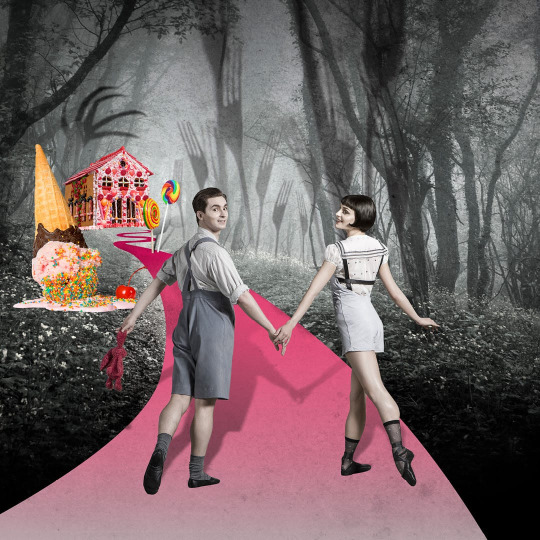
... to folklore (the show made the insanely clever decision of replacing the bird eating the crumbs in the forest with schnabelperchten brooming them away).
And more recently I have been looking into a 1930 black-and-white French movie called "Cinderella of Paris", that transposes/twists/parodies the Cinderella story within the context of the realistic 1920s Paris.
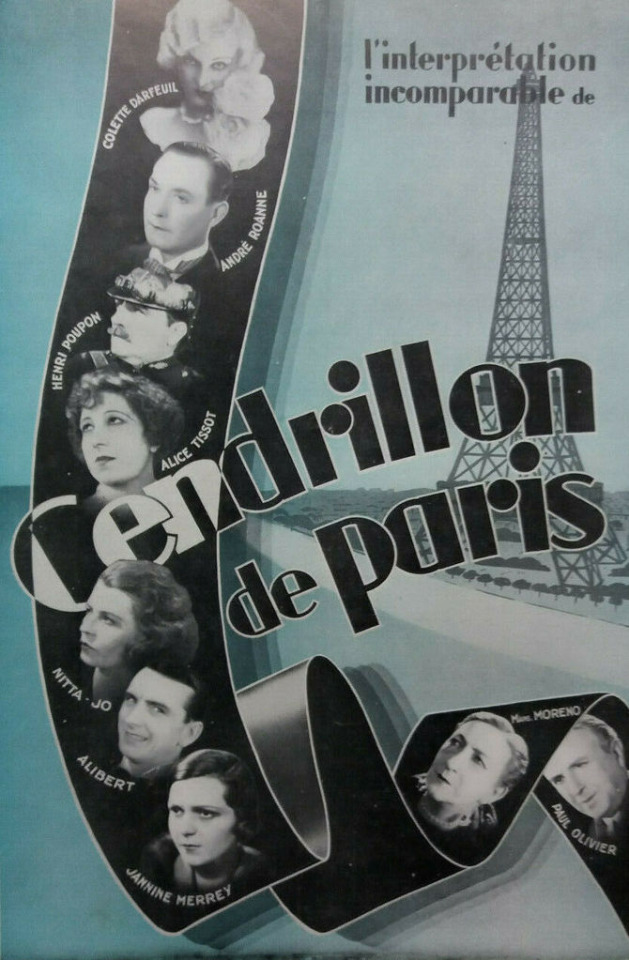
And the main ball, the equivalent of the titular Cinderella ball, is made into the Sainte-Catherine dance. Which is absolutely fitting and perfect for a Cinderella within an inter-war Paris. If you don't know, up until the mid-20th century, in France Saint Catherine's day was the time of a great popular ball/public dance whose entire purpose was to allow girls of 25 years old or more, yet without a male companion, to find a suitor/husband/boyfriend/fiancé. It was the big time to "solve the problem of the old maids", of which Saint Catherine was the patron - and it was THE big "love day" long before the overwhelming Americanization of Saint Valentine's Day.
All of that to say, I really love the inclusion of little cultural details and elements within fairytales retelling or transpositions - either of the original fairytale's culture, or of the culture in which the fairytale is transposed. Not only does it make the product quite cool, clever and/or interesting, but it also shows that you put a lot of thought into the tale's original setting and the point of moving up to another time period or geographical era. It is the opposite of just slapping a "That's X country" or "That's X time" sticker onto a fairytale without doing much more work.
#fairytales#fairy tales#fairytale adaptations#hansel and gretel#cinderella#cendrillon de paris#royal new zealand ballet#rnzb's hansel and gretel#royal new zealand ballet's hansel and gretel#fairytale transpositions
26 notes
·
View notes
Text
So, if I know my Mesa Island geography, we should be getting pretty close to Songshroom Marsh. Wonder if Yoyo's still hanging around here?
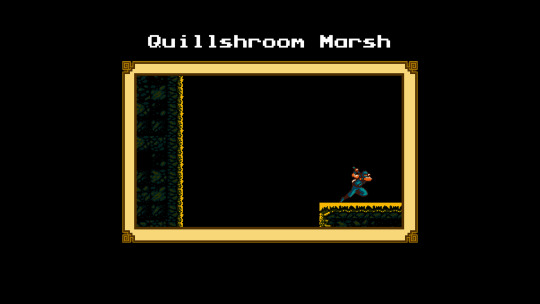
That's, uh... that's... not an ominous name or anything....
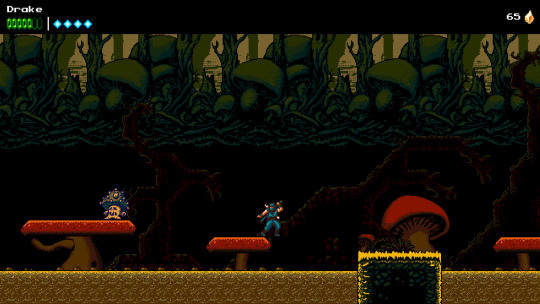
This place... doesn't seem quite as fun as Luana made it sound.

Okay, full disclosure, I was actually trying to drown myself in the mire because I want to tell Quarble about all the cool stuff I did.
But this is cool too. I guess the moral of the story is that sometimes attempted suicide comes with neat prizes. If they ever write a fable about all the things I learned on my travels, I'll be sure to include that.

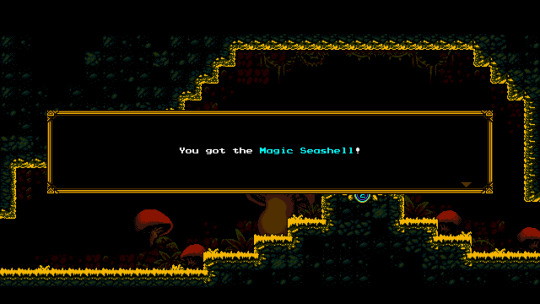
Holy shit, the Magic Seashell? The one from Watcher Island that lets you breathe underwater?
Wait, no, I can already do that for some reason. Plus, it doesn't really look that cute. Luana said it was a cute pink clamshell thing. She was very excited about it. But this more resembles a slug.
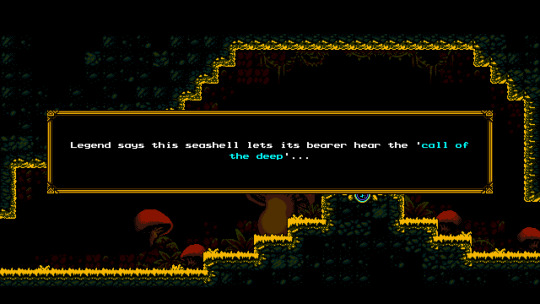
That does sound like it relates to the magic Docarri shells, though. Hmm....

Yeah. Uh. What the hell happened to this place? Luana didn't like it very much but what she described pales in comparison to how tortured and gross the marsh is.
Also, she called it Songshroom but the sign at the entrance said Quillshroom. So. Obviously some changes have taken place.
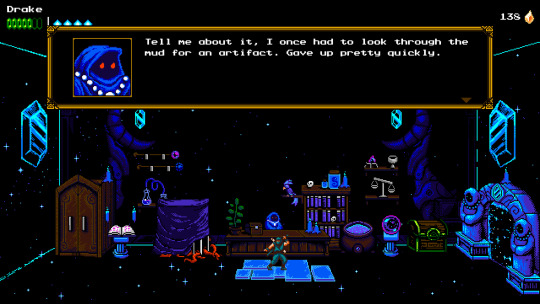
Oh, is it the cool magic seashell I found? 'Cause I found it. You can't have it back. It's mine now, as laid down in the Mine Now, Fucko bylaw.
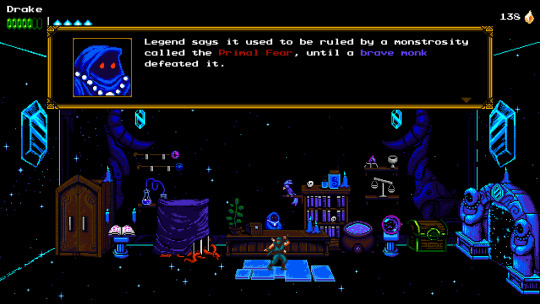

Primal Fear... fuck, I know that name. It's... somewhere. Maybe one of Teaks's stories? I don't know. I've heard it before. I know I've heard it before.
No, wait! It was one of the volumes of prophecy that Yoyo kept in her cabin. She had a book on Primal Fear. That's where I know the name from.

Is. That. Where the living mushrooms come from?
...Luana wrote about them singing. The ones I've seen have not been singing. I don't think they're enjoying their fungal lives anymore.
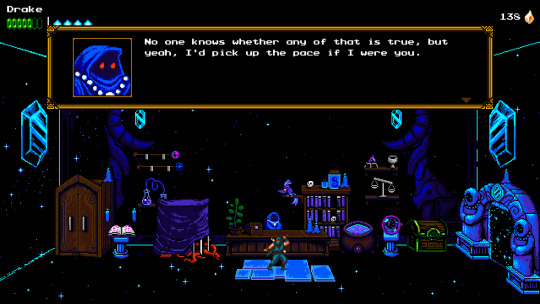
With gusto.

I can't believe you told me to fight it! Do you have any idea how humiliated I was!? That was the most embarrassing moment of my goddamn life.
And I once screwed up Cloudstep practice so hard I ended up dangling from a tree branch by my pants around my ankles. I met Quarble on a return trip through a challenge I'd already solved. So the competition is steep.
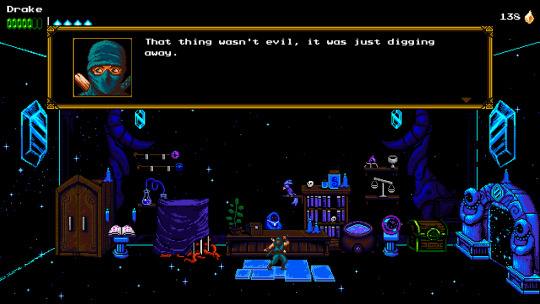
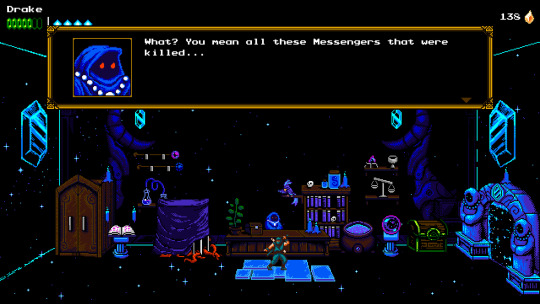
How many times have you sent members of my order to their graves to pick a fight with a harmless glowball minding his fucking business!?
FUCK. No wonder Luana called probably-you an assclown!
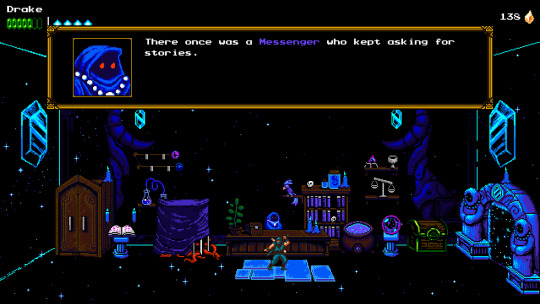

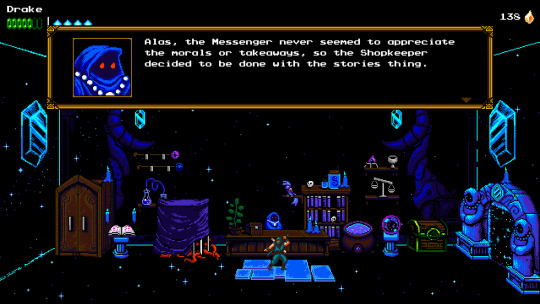
WHAT. NO. I don't really see much relevance or importance in your stories - I think the pear tree one might have been about Yoyo maybe? - but I've been enjoying them nonetheless.
I'll stop touching your cabinet if you keep sharing stories with me. ._. Pweese?
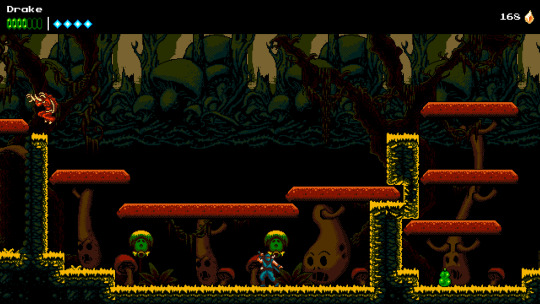
Oh, there's the singing mushrooms. Okay, so they are still here.
They. Uh. They don't look very cheerful, though. Luana said they were cheerful.

Gotta say, not a fan of the titular quillshrooms. Their quills are incredibly difficult to dodge, especially when they fire while I'm in midair. What total assholes.
As a botanophobe, I can't be surprised by this, but fungus is far more dangerous than turtles.

...how stupid do I feel like being today?
I am... passably competent at the Cloudstep. I think I could--
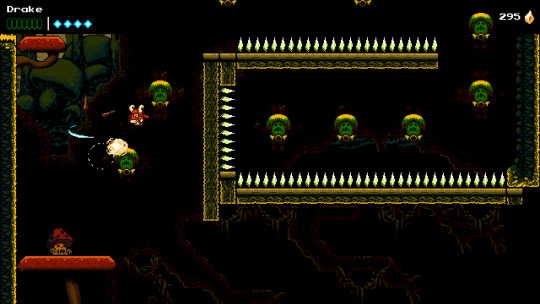
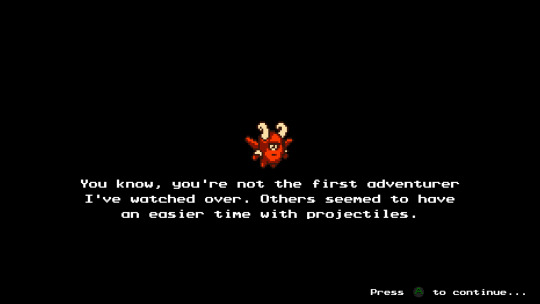
Okay, I want it on record that I actually made it, but was killed by a Quillshroom afterwards. After being thoroughly tenderized by spikes in the process of making it but that's beside the point. The point is I'm awesome and this is definitely going down as a W in my book.
Not important. What's important is HEY BESTIE, check out where we are? Yeah, that's right, I'm blazing trails through Quillshroom Marsh with my expert jumping and profound getting-stabbed proficiencies.
I know we were in Howling Grotto last we talked but I... found the exit of my own accord and nothing else happened. Now we're here. Trying to not be here as expediently as possible because I don't want to be a mushroom.
...
Why is this my life?

...we've found one secret path beneath the mire. I wonder... This does look very suspicious.
They thought they could hide their secrets from me. Joke's on them, I am highly skilled in observation and pattern recog--


I think I hate this place.
10 notes
·
View notes
Text
Oh and about my Lemon Demon OCs:
(OCs referred to by the song they represent, some of them have stories tied to more then one song)
Crisis Actors and Touch-Tone Telephone are besties. They want to find out what's going on with all the supernatural shenanigans going on around town. Crisis Actors has crippling anxiety and TTT wants to befriend all the cryptids she can. She also seems to have no family whatsoever despite being like 16.
Cabinet Man is pretty much totally nonverbal except for beep boop noises. He probably "died" in his early 30's but has the soul of an old man. He uses he/it pronouns.
Redesign Your Logo is an androgynous cult leader. What's the cult for? Who knows? It's spooky though (and probably ant related)
Man Made Object would very much like to be left alone please. Seriously, why is the cult here?
Reganomics is actually two people. Specifically two mafia bosses who are both running for mayor and end up kissing... somehow. When He Died is a trio of interns working for a private detective agency slowly realizing how in over their heads they are when given a case no one else believed was real.
Soft Fuzzy Man is No-Eyed Girl's boyfriend, at least while he was alive. Now he's cripplingly lonely and painfully touch starved despite not having a body (but he's hoping to get back together when he finds her)
No-Eyed Girl, When He Died, Sweet Bod, Hip-Hop Cherry Pop, Angry People and Soft Fuzzy Man are all about one guy with a really weird love life and a soda pop addiction.
Crisis Actors is also the singer is Atomic Copper Claw, the guy with the titular copper claw being one of the occasional maintenance men who probably got help from the person in Modify.
Yes, I've thought too much about this.
6 notes
·
View notes
Note
could we get lore for professor callenbach? what's his deal?
I’ve been meaning to introduce this guy, here you are
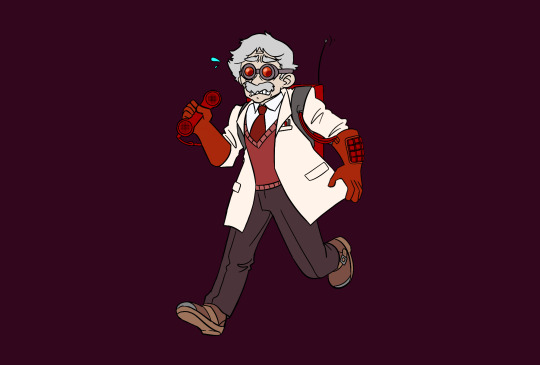
Professor Alexander Callenbach.
Lore: Initially an engineering teacher at a local university, Prof. Callenbach’s life changed when his experimental radio started picking up strange broadcasts from unknown sources. Piecing together a rudimentary theory surrounding these messages, Callenbach managed to discover a possible source: a mysterious central figure known simply as the ‘MC’.
After increasing references to UFOlogy and paranormal phenomena began cropping up in his class lectures, Callenbach was eventually ‘forcibly retired’, and became more and more secluded.
Convinced he was the only person who understood and cared about these possible threats to humanity, he threw himself headfirst into his preparation for various unnatural disasters, finding comfort in one particular radio show along the way…
In his early to mid sixties, but still fairly physically fit
His dismissal from his university position was a decision made purely by the higher ups: his students generally considered him a helpful and engaging (if somewhat eccentric) professor and were sad to see him go.
His equipment kit consists of a modified portable radio and a touch-tone telephone capable of sending and receiving signals over surprisingly long distances, as well as (in theory) beyond the boundaries of our universe. Design-wise, it’s partially based on the TF2 medic’s medigun pack (a lot of my scientist characters take inspiration from the medic, actually…) and the infamous Power Glove (its so bad).
His equipment has a rudimentary form of artificial intelligence- he affectionately refers to it as ‘Toni’.
Drives an old red Chevy pickup truck that he usually uses to cart around his heavier equipment.
Retains his professorial demeanour and comes off surprisingly approachable and sensible (until he starts talking about ancient aliens, of course)
He attempts to control his extreme paranoia by being prepared for every eventuality (though is a little too much of an ‘absent-minded professor’ to do so effectively.)
Accomplished violin player (if only in his spare time)
Was probably involved in early Kirk/Spock fan fiction
Deeply admires (read: has a massive crush on) the host of Enigmatic Enigmas of Esoteric Enigmas, a radio show that only seems to broadcast on AM frequency and showcases various purported conspiracy theories, mysteries and supernatural occurrences. Callenbach eventually manages to work up the courage to call in (or rather, actually speak instead of breathing into the receiver) but he can never quite explain himself properly. The host, Morris Hammond, is quite patient with him, all things considered (possibly because he’s his only caller).
Develops an intergenerational friendship with Dylan Livwright, playing the Doc. Brown to his Marty McFly.
Is aware of numerous other supernatural characters and events, especially the Ant Folk, Cabinet Man and Sweet Bod.
Excellent with engineering, terrible with technology.
General appearance was probably unconsciously based on the titular character from Professor Fizwizzle, the first game little me ever encountered that let you make your own levels- what fun!

7 notes
·
View notes
Text

Drosselmeyer (Princess Tutu)
"Another name for The Web is "The Story Spinner", and Drosselmeyer is just that. A former author who was murdered by those who feared his reality-warping abilities through his writing, yet managed to continue his final story, The Prince and the Raven, from beyond the grave. How did he manage to do that? By writing the last of his story in his own blood and taking control of an entire town once his two main characters decided they had enough, escaping the story by going into the town he ended up controlling. He turned the town into his new setting and turned a duck into a human - the titular Princess Tutu (who was really a supporting character in his story) in an attempt to keep the story on track. In the first season, he has a puppet attendant named Edel who assists Ahiru/Princess Tutu and act as a narrator in his stead. Drosselmeyer is quite genre savvy and hates it when his "central characters" stray too far from their assigned role… or rebel against the narrative. Then again, these characters are real, three-dimensional people, but he does not care. As long as he's entertained and they give him a good story, he's all set."
Cabinet Man (Lemon Demon)
"Cabinet Man was a person who managed to turn himself into a living arcade cabinet. He enjoyed nothing more than to be played by children visiting the arcade. They gave him love and devotion, and he was able to reach into their minds. He made them addicted to his game, yet obedient and patient as they waited in line. These factors of technology, addiction, and docile behavior are all present in the web, and the song itself is almost like a statement from the Institute.
Cabinet Man's Song"
12 notes
·
View notes
Text
the second ep of cabinet of curiosities was made for me actually because i looooove rats i love pestilential rats i love sylvatic plagues i love the flesh eating pandyssian bull rats of dishonored i love the seething masses in a plague tale i love drinking and subsuming them in vampyr i love chittering amorphous swarms of rats and i think we need more of them in media. lovecraft’s rats in the walls, poe’s pit and the pendulum, camus’ plague. room 101 in 1984. 1922 nosferatu which has the pale and withered—plague-victim-esque—titular vamp arriving by ship with an army of rats which disembark and begin besieging the village... rats as portents of death, vessels for disease, vehicles for divine judgement, deeply imbued with our cultural fears. and rat kings are like those elk whose antlers intertwine irrevocably and who become fattened with knowledge of each other having been forced to contemplate one another until death (djuna barnes’ words not mine). they interanimate, they become conjoined, a something rather than many things, and they are fattened with horrible knowledge in doing so. which to me is also grotesquely godly (as all godly things ought to be grotesque). nebulous boundaries and monstrous understanding are at the heart of godhood. to me
i love them as metaphor i love them as single organism and aggregate whole i love them chaotically good or bad and also. they’re god's smiting palm. to me
#thumbs down however to the rat stomping scene in the knick. dishonourable mention#cabinet of curiosities#graveyard rats#gnawing at their vitals
29 notes
·
View notes
Text
I have so many nitpicks of the 2005 remake of The Cabinet of Dr Caligari that I just had to make another post about this. Enjoy!
During the scene as Franzis is watching Caligari and “Cesare” sleep, he has a gun. Tf? Like, I sort of understand why he has it, but at this point in the story, nobody has really pinned Caligari and Cesare for the murders. I mean, they are suspects but, y’know, innocent until proven guilty. Then, Franzis contemplates taking his own life, which comes out of nowhere. This occurs due to the endless use of foreshadowing surrounding Franzis and this decision where he begins to turn the gun on himself took me by surprise. He doesn’t do it, but it still made me do a double take. I know this scene is suppose to increase tension, but I found this bit really uncomfortable and unnecessary. The original had Franzis do a stake out, no weapons at all on his person. So the choice for 2005 Franzis to have a gun just comes out of nowhere.
Jane accepts Franzis’ marriage proposal. This really didn’t need to happen and I know that this is all in Franzis’ head, but regardless, Jane accepting Franzis’ marriage proposal was really unnecessary. I mean, he does so AFTER ALAN’S FUNERAL. Bro couldn’t fucking wait a few days to pop the question and asking right after Alan’s burial has me detest this Franzis even more. Jane shouldn’t have accepted the proposal as I feel like it interrupts this somber moment by inserting this “romance” between the two to be solidified.
I’ve touched on the dialogue in my last post, but I need to mention the acting. Part of the reason why I enjoy the original 1920 film and have rewatched it many times is because of the acting. Given that the original is a silent film, the acting really pushes the narrative with its cast of characters theatrical performance. I could understand what the characters are doing just by their acting alone. The remake presents a very dull and lifeless performance that it’s almost depressing. None of the characters give a good performance because, along with the spoken dialogue, is flat and almost comical. I couldn’t take any of the characters seriously. I suppose the only character whose acting was okay to an extent would be Cesare since there’s not much they added to his character that I could pin point.
They tried to humanize Caligari so much. This guy would be the last person that I would ever want to see get some kind of backstory fleshed out. Obviously Caligari is the titular mad man who’s obsessed with fulfilling this dark urge to control someone to carry out murder, which is pretty diabolical. The original does this too by displaying Caligari as someone whom you don’t want to mess with. This is the same man who commanded Cesare to kill the town clerk because bro had the audacity to tell him to wait. The 2005 film, for some reason, attempts to flesh out his character by having him come up with weak BS reasons to explain why he does the things he does. I don’t think Caligari needs to explain to anyone his schemes because I believe he’s someone who doesn’t have to. What strikes me as odd would how this remake has him detailing his profession as a psychiatrist to Franzis and Jane, which I don’t think matters. What matters to me would be the implications behind what Caligari does and a lot of people speculate on Caligari and Cesare’s dynamic within the film and outside of it. Also, the remake brushes away Caligari’s descent into his obsession by making it a single scene which takes away the gravity of the character as a whole. You don’t see him spiral into madness; it just happens in a very sudden (and silly) way.
Okay, this one just happens to be a silly nitpick but the way Cesare touches Jane. I literally felt myself squirm when I saw that; it just looked so awkward and uncomfortable. To compare, the original scene had Cesare sort of hover over Jane with his arm extend outward and he lowers it slowly to touch her. It’s still creepy, but it racks up the tension. Looking into it further, the way that Cesare precedes to lower his hand presents an air of curiosity on his part. Like, there’s this pretty chick who’s so delicate that he hesitates to kill and, at least for a moment, breaks his master’s commands. At least that’s how I interpreted it. Here, in the remake, Cesare tucks a strand of Jane’s hair behind her ear and caresses her cheek, lowering his head in the process. Like, bro you need to back up! It’s so creepy and weird and it just makes Cesare less of a looming threat and more of a horny teenager. This scene, in my opinion, feels so much like a bad fanfic that someone wrote out because [insert reason here].
Jane’s brother kills Cesare. I don’t have in depth complaint about this. The fact that the film needed to have someone kill Cesare is just the laziest thing that I’ve seen.
For the most part, the costuming looks decent but Jane’s outfit really doesn’t seem to fit her overall character. The original film had Jane dress that made her appear both alluring but ladylike. Elegant yet down to earth and her outfits reflect that image. With the remake, Jane is dressed in a way where it’s distracting, at least to me. This is especially true when she’s sleeping and you get these up close shots of her figure and, I don’t know, I think the choice of posing and costuming really highlights how the remake wants you to see Jane: less of a character and more of an object.
Franzis was VERY aggressive in the remake to point where I couldn’t really root for him (didn’t root for anyone at all). The original presented Franzis as someone who’s upset but persisted in finding answers without trying to pick any fights that would jeopardize the investigation. He worked with law enforcement and Dr. Olsen to get something out of Caligari without being overly aggressive. The remake had Franzis take on a bad cop persona and had him be on edge constantly. He jumps to conclusions without considering other suspects involved, which the original Franzis does. Now, that doesn’t mean he accepts it. It’s him questioning whether or not if what he believes to be true and he seeks to figure it out by doing a stake out by watching Caligari and “Cesare” in the hopes that he’s proven right or wrong in his assumptions. The remakes just reaffirms Franzis’ belief that Caligari is the one who committed the murders without even taking into account of other possibilities. Once again, he brings a gun proving that he’s a person who would shoot first and ask questions never.
This entire film condescends the audience so, so much. It talks down to the audience and answers so many questions by over-explaining things, never once allowing the audience to interpret anything or come up with their own conclusions. I really didn’t appreciate that the film had to handhold me throughout the story and feels like the remake couldn’t even trust itself with the original film’s open ended nature.
#the cabinet of dr. caligari#cesare the somnambulist#rambles#silent film#the cabinet of dr caligari 2005#i’m not done yet#this remake has so many issues
6 notes
·
View notes
Text
I’m spending my Halloween watching Guillermo del Toro’s Cabinet of Curiosities, and am absolutely delighted to see adaptations of HP Lovecraft’s stories Pickman’s Model and Dreams in the Witch House get the live action treatment.
I recognized Ben Barnes right away, but I also thought the titular Richard Pickman looked familiar…after looking up the cast, it turns out the ghoulish artist is played by Crispin “George McFly” Glover with a creeeeeepy weird accent to boot.
On that note, I still want more than anything to see GDT adapt The Dream-Quest of Unknown Kadath (after At the Mountains of Madness, of course), since that story fits so well into the creepy-yet-heartwarming mystique he’s best known for. And even more so because now I want to see his interpretation of Pickman’s ghoul-self too. 👹👻
#pickman’s model#guillermo del toro#guillermo del toro’s cabinet of curiosities#Ben Barnes#crispin glover#HEY MCFLY!!#h.p. lovecraft#hp lovecraft
43 notes
·
View notes
Text
The Perrault fairytales: Bluebeard
After covering Perrault’s “Little Red Riding Hood”, it is logical to go next to “La Barbe Bleue” - “The Blue Beard”, though it is often shortened in “Blue Beard” or “Bluebeard”. It is logical because this story is the next in Perrault’s Histoires ou contes du temps passé, the third tale right after Little Red Riding Hood.

The story opens by describing the titular Bluebeard: he was a man who had many beautiful houses in both the city and the countryside, who had dishes of gold and silver, who had ornated furniture and golden carriages - so he was VERY rich - but unfortunately for him this man had a blue beard, which made him ugly and terrifying - so much that all women and all girl fled before him. (Note: “Bluebeard” is not his actual name. It is not even a nickname given to him in-universe, “La Barbe Bleue”, “The Blue Beard” is merely the name the narrator gives this character). Now, Bluebear had a neighbor, a “lady of quality” (aka a lady part of the higher ranks of society) who had two beautiful daughters. Bluebeard ask her to have one in marriage, though he allowed the mother to choose which one she would give him. The two girl didn’t want him as a husband, first because of his blue beard, but secondly due to the fact that he had already married several women, and they had mysteriously disappeared without anyone knowing what happened to them.
However Bluebeard decided to better the know the girls (and in return have the girls know him better): he took the girls, their mother, “three or four of their best friends”, and “some youth of the neighborhood” to one of his countryside house and this whole group stayed there for eight days, having promenades, and hunting parties, and fishing parties, and danses, and feasts, and games... They had so much fun, so much entertainment, so much pleasantries that the youngest of the daughters ended up “thinking that the master of the house didn’t have the beard so blue anymore, and that he was a very honest man”. So as soon as they returned to the city, they married.
After one month, Bluebeard said to his wife he had to travel to the province, for at least six weeks, due to an important business. He told her to have a lot of fun while he was gone, to invite her friends over, she could take them to one of his countryside houses if needed, he told her to just go wild. And he gave him the keys to his riches: the keys of the two great furniture storages (for the unused furniture), the keys to his dishes of gold and silver (which you shouldn’t use everyday he reminds her), the keys to the safes where he keeps gold and money, the keys of the small chests where he keeps all of his gems, and finally the skeleton key of all his rooms. But then... he told her about a little key, which was the only key she shouldn’t use. A small key, that opens a small cabinet, at the end of a great hallway, on the lower floor. He told her she wasn’t to use the key or open the cabinet, and if she did, he warned her nothing could protect her from his wrath. She promised to obey, and after many great kisses, Bluebeard left.
As soon as he was out all the neighboresses and the women friends of the young bride arrived to her home - they wanted to see all the riches and wealth of Bluebeard, but didn’t dare come while the husband was in the house. The group explored everywhere, admiring the many beautiful clothes, the exquisite tapestries, the refined furniture, the great mirrors (mirrors were luxury items at the time, and Bluebeard is said to have tall mirrors in which you can see yourself from head to toe, which means he is VERY rich indeed)...But unlike her friends, the new bride wasn’t entertained. She couldn’t care about the praise or jealousy of all these other women - because she was obsessed with the forbidden cabinet of the lower floor. She wanted to open it so much she ended up leaving her friends and guests on the upper floors to go down the lower floor alone (the narration even points out how rude it is to just leave your guests on your own without telling them where you’re going) ; she was so impatient she almost broke her neck “two or three times” while running down the staircase, In front of the door she stopped a minute to consider what kind of misfortune could happen to her, but she was too tempted - she opened the door. “At first she saw nothing, because the windows had been closed ; after a few moments, she noticed that the floor was covered in blood, and in this blood was reflected the body of several dead women, attached to the walls”. As she discovers in horror, in this cabinet are the previous wives of Bluebeard, that he all slit the throat of one after the other. The new bride is so terrified she drops the key. She flees the room as soon as she can, but notices that the key got stained by the blood.
Immediately she starts cleaning it... but the blood won’t go. She washed it in any way she could, with all the products she knew, soap and sand - it was no use because “it was a fairy key”, and so if the blood was removed from one side of it, it appeared on the other. Bluebeard returned the very evening his wife had opened the cabinet, telling her that he had received some letters telling him his business was done and he didn’t need to travel. His wife did everything to look happy of his return. The following day, he asked her back the keys, and he gave them all except the small one... Bluebeard understood what had happened, but he still asked her where was the small key, he forced her to bring it to him, and then asked her why there was blood on it. The wife tried to play dumb, saying she didn’t know, but the Bluebeard was no fool, and he announced that since she had entered into the cabinet, she now has to take her place among “the ladies down there”. The woman begged her husband, cried, threw herself to his feet - to no avail, since Bluebeard had the heart “harder than a rock”. She only managed to allow him to let her pray one last time before dying. He gave her “half a quarter of hour” (so seven minute and a half or so).
Once she was alone, the young bride called her sister, Anne, and told her to climb on the tower to see if her brothers are arriving - because they had promised to come today. Anne climbed to the top of the tower, and the bride regularly asked her “Anne, ma soeur Anne, ne vois-tu rien venir?” (Anne, my sister Anne, do you not see anything coming?), to which the sister always answered “Je ne vois rien que le soleil qui poudroie, et l’herbe qui verdoie” (I only see the sun shining and the herb greening”. Bluebeard, armed with a great knife, called his bride from the lower floor, ordering her to come to her death - and each time she said “One moment!” before asking her sister again if she saw nothing. But each time Anne saw nothing, and each time Bluebeard’s calls became more threatening and louder, to the point his voice started to shake the very house. Finally, at her last call, the bride hears from Anne that her two brothers are arriving riding horses - but this arrival coincides with her being forced to go down, having her hair held in one hand by her husband, as he rises his great knife with the other... She asked, one more time, for a prayer, but Bluebeard denied her that.
Hopefully in thus moment, something hit the door so loudly Bluebeard stopped, frozen. The door was opened (by who? It is unclear, we just know that someone opened the door), and suddenly two riders arrive, a sword in their hand, and rush towards Bluebeard. Bluebeard recognizes the brothers of his wife, one being a “dragon” (a type of cavalry soldier of old France), the other being a musketeer. To save his skin, Bluebeard fled, but the two brothers reached him before he could reach the porhc. They stabbed him with their sword and left him for dead. “The poor wife was almost as dead as her husband, and barely had the strength to embrace her brothers”.
Since Bluebeard had no heir, all of his riches were herited by his wife. She used some of her newfound riches to marry her sister Anne to a gentleman that had loved her for a long time. She used another part of her money to buy the title of captain for her brothers. And the rest allowed her to marry herself a very honest man, that made her “forget the bad times she had with Bluebeard”. The end
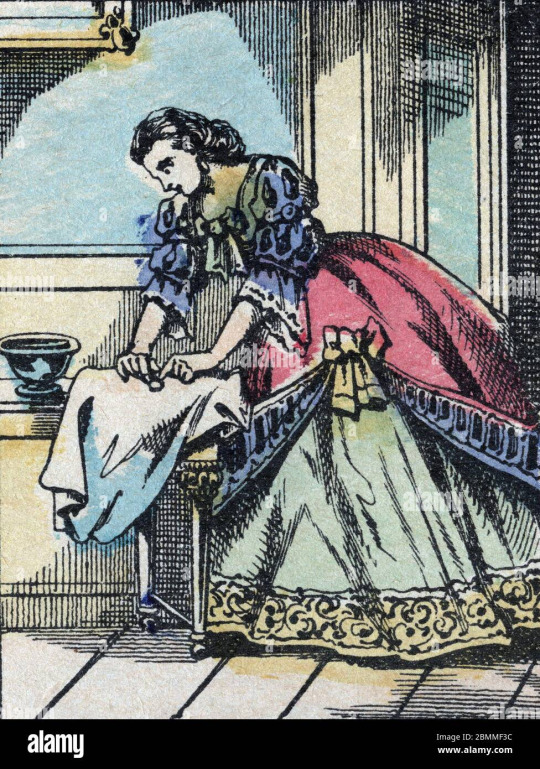
As usual, after the recap, some analysis!
Tony Gheeraert, in his analysis of the text, points out that the position of the fairytale, in the Histoires ou contes du temps passé, is very significative: it is between “Little Red Riding Hood” and “Puss in Boots”, and precisely it unites the warning about men’s violence on women/sexual violence of the first, with the social satire and social parody of the second. A social satire, because the most famous and widespread interpretation of this text, is that it is a mockery (or denunciation) of the social habits at Perrault’s times, those of the end-of-17th-century.
More precisely, Bluebeard seems to be tackling the nobility vs bourgeoisie dynamic. Bluebeard is usually interpreted as the image of the rich and wealthy bourgeois - he is not said to be a noble in the story, he is a businessman (he has to leave his hosue for “business”, and yet he is massively rich and wealthy, and some like to interpret his blue beard as “He doesn’t have blue blood, but in his effort to imitate the noblemen, he has a blue beard, to openly show a form of fake nobility”. The idea of Bluebeard as the caricature of the bourgeois is even more obvious when you observe the whole idea behind the marriage: Bluebeard wants to marry the daughter of a “woman of quality”, aka a woman of aristocracy. He doesn’t care which of the daughters, he just wants the daughter of a noblewoman. And said daughter of nobility is not seduced by Bluebeard himself, but by the various riches, and the numerous entertainments, and the sociability he offers her - she gets blinded by all the shining things in Bluebeard’s life, and thus agree to the wedding. This seem to be a criticism (or caricature) of something that really happened at the time, and was heavily debated: as some noble families found themselves in debts or losing money, they decided to marry the wealthiest of the bourgeois of the time. They were not marriages of love, but of arrangment, as the nobles hoped to gain the money of the bourgeoisie, while the bourgeois obtained the titles and higher social rank of the nobility. This kind of wedding could be found talked about a lot in Molière’s comedies for example. And such a wedding seems to be the case here.
But of course, the magic of Perrault’s tales is that they can be taken out of their historical and social context to be applied to the modern world. The same way Little Red Riding Hood is still very relevant as a story about fearing the raw, bestial, destructive sexual desire of men predating on young girls, Bluebeard is also a very relevant tale about marital violence, and murderous husbands. About this subject, let’s talk about the Morality Perrault places at the end of the tale: Bluebeard has been interpreted in the inversed way of what Perrault intended because of said Moralities. People read them first-degree (and I saw that the translations in English changed the sentences in pretty heavy ways), and as a result this is what they got: a first Morality that condemns curiosity, especially feminine curiosity, and a second morality that says “No husbands like Bluebeard exists today, now it is women that are modern Bluebeards, the good old days where the man was the master of the house is gone.” And these first-degree reading lead to people believing Perrault was a raging misogynist.
Which is as false as it can get. Perrault was far away from being a woman-hater ; in fact his main rival in French literature, Boileau, was a misogynist, and Perrault opposed him in many points, including this one. Perrault was part of the Moderns, and part of the salons, and this already means a sympathy and admiration for women - the very genre of the fairytale was a “female” genre in people’s minds. I am not saying Perrault was a feminist mind you, he was still a man of his time, but he certainly was no woman-hater, and the key to understanding his Morality, like all of his Moralities, is irony. Most of his Moralities, only added to avoid the censorship (which disliked nonsensical tales and only wanted stories with “useful” content), were actually subtle jokes to entertain his adult audience - and this becomes evident when you compare said Moralities with the actual story (to fully understand the fairytales of Perrault one has to PAY ATTENTION, which is something a lot of people haven’t done). Take the first Moral condemning curiosity. Already it isn’t a condemnation of “female curiosity” per se, it is a denunciation of curiosity as a whole, with a brief joke thrown in of how his words might sadden women (a reference to the widespread belief at the time was curiosity was one of the main flaws of women). But it is true the morality says that curiosity is a pleasure not worth it, that causes a lot of regrets for very little pay-off, that it is a superficial thing that “costs too much” and should be avoided... And the story seems to depict such a silly caricature of curiosity: we have a woman so curious here that not only she disobeys her husband the minute he leaves, but she also almost breaks her neck THREE TIMES while rushing down the staircase, and abandons her guests on their own in the upper rooms. However, when you consider the ending of the story, you realize this morality condemning curiosity is much more of a joke than anything else: what did the woman’s curiosity caused? It is true this led her to almost being murdered, but the actual effects of curiosity in this narrative are the death of a monster (Bluebeard), the woman’s whole family becoming richer and gaining a higher social status, and the woman and her sister having new, happy marriages. Turns out this curiosity condemned by the Morality has a LOT of good effects and a lot of REWARDS in the story right next to it. There is clearly a double-discourse intended by Perrault. “Let me show you this cool thing and all the cool things it does... and then let me tell you it’s wrong, right after I told you all the rewards you’ll get.” The second Morality is also an obvious joke, as it basically says “If a Bluebeard existed in modern days, he’ll be no threat and easily tamed because in a modern couple, no matter the color of the man’s beard, it is clear who is TRULY the leading one ; and in this world there isn’t husbands as terrible as Bluebeard because today, no matter how jealous and nasty they might be, they fear their wives.” It is basically the end of a process of humiliation for Bluebeard, a process that started with his undignified death (stabbed from behind by brave soldiers as he was trying to run away), and is completed by this moral that basically says “Bluebeard was only a monster because he lived in old days where women were weak and docile ; today he’d been a wuss fearing women”. A message with also strangely modern connotations X)
There is a common habit of saying Bluebeard had seven wives - but this isn’t found in Perrault’s texts, so I wonder where this comes from... And there is also a common interpretation nowadays that all his previous wives were killed because they were “curious” or Bluebeard put them to the same test as the woman of the story. While it is an interesting theory... Nothing in Perrault’s text actually suggests this. All we know is that the protagonist of the story has to be killed and join the other wives because she opened the forbidden door and saw their corpses. From this we can deduce that the other wives might have been killed too because they discovered the corpses of their predecessor, it makes sense... But then, the subject of the first wife pops up. Why was the first wife killed? She couldn’t have discovered the corpses, since there were none before (at least none we knew of). Was she killed by another act of curiosity, is this curiosity that Bluebeard hates? Or did Bluebeard kill her for another reason - or maybe with no reason at all? There is a true mystery here that opens an entire debate: is Bluebeard a man with a perverse logic that only acts to punish the perceived crime of his wives, or to cover as best as he can his own perverse actions (the same way he tries to have people ignore his blue beard by lots of entertainments and riches)? Or is he a true psycopath who put this whole trial of curiosity as a perverse game or rigged test, and manipulated his wife into opening the forbidden chamber? Many interpretations are possible...

The fairytales of Perrault are noticeable for their dream logic (which I talked previously), but if most of them are dreams, Blue Beard is a nightmare. Not only is the dream-logic in full effect here to cause horror, but overall this story has been noted as the true embodiment of the “uncanny”.
Many people have noted that this story is the less “wondrous” of the fairytales, due to the very little presence of magic in the story. The two only supernatural elements would be the fey-key and the unusual color of the beard, but precisely but having these typical elements of the fairytale appear in what is actually a pretty “realistic” setting closer to crime stories or the short stories of Perrault’s times, makes them feel even more abnormal and wrong, and serve as the most obvious details that try to “crack” the reality. These two elements already point out at the wrongness of Blue-beard, at how not truly “human” he might be, from having a beard of unnatural color, to having magical items in his possession. And let’s not forget that, when he gets angry at the end of the story, his booming voice makes the house shake...
But beyond that, time and space itself actually gets broken into this story. When you follow it in the heat of the action and the flow of the narrative, you get a certain picture, but when you start to pay attention you realize things do not make sense, especially since Perrault works through time ellipses that only let the reader guess what happened. When the woman is first taken by Bluebeard to his home, it is to one of his “countryside homes”, where they have fun for eight days. After that they are married, and she starts living with Bluebeard. While it is not said, it seems that as a result she might be with one of his “city homes” he has been said to own (typically people lived in the city, and their countryside home were secondary residences). It is especially obvious since, before leaving, Bluebeard tells the wife she can invite her friends “to the countryside”, meaning she IS in one of the city-houses of Bluebear. And yet, when Bluebeard is getting reading to kill her, sister Anne says she only see vast expanses of grass outside the house, and the wife’s brothers have to ride across them in a cloud of dust before arriving... So this house is in the countryside. Either the characters keep jumping into the various different houses of Bluebeard, either it all takes place in one same house whose location keeps changing - and the latter seems to be the case, since the house of the city and the countryside house seem to be both the house containing the “murder room”. Or maybe, if we really stretch things, we have something similar to the “Dionae House”, where all the houses of Bluebeard are somehow just one building, manifesting itself at different places around the area - creepypasta time!
And to this first inconsistency, follows a second one: the nature of the house itself. Perrault uses here the plans and disposition of a typical “big house” of the type, with two “apartments”, one on the upper floor, for the lady of the house, and one on the lower floor, for the master of the house. This divide is pretty clear when Bluebeard awaits to kill his wife: she is upstairs, in her rooms, while Bluebeard is downstair, waiting for her in his (in fact, he seems unable to cross from one floor to the other, since it is the wife that is compelled to go downstairs). And yet, many people remember and depict Bluebeard’s house as a castle... Because Bluebeard’s house has a tower, where the sister Anne goes to wait for the brothers - and big houses at the time usually didn’t have “towers”. And similarly the scene of the wife descending a “small, hidden staircase” where she almost breaks her neck several times, to arrive to the forbidden room, invites the vision of these narrow, long staircases of castles leading to dungeons or torture rooms. So basically, while it is a countryside home, when it reaches moments of anxiety, tension or horror, the building grows to castle-dimensions... This is literaly nightmare-logic. Just like in a nightmare you can be in the same building but in different landscapes at once, and just like in a nightmare the place you are in might shift depending on where the dream goes.
This system of dream-like incoherence is also present when it comes to the question: Are the main characters (Bluebeard and his wife) alone or not in their house? We know the sister of the wife, Anne, is present in the house of Bluebeard, but the thing is we never heard of her moving in until the wife is about to get killed - she just pops out of nowhere the same way the Fairy Godmother appears out of nowhere in Cinderella. Even more strikingly, Anne only interacts with her sister, and never once with Bluebeard: her sister doesn’t inform her of her inpending death, Bluebeard doesn’t try to do anything to Anne, Anne doesn’t interact to save her sister... Anne only seems to exist in the climax as the eyes of her sister, to relay information from the top of the tower. This led many people to wonder if this “Anne” did truly exist, and wasn’t some sort of split personality or strange projection/spirit - though we know she does exist, since she is mentionned in the beginning of the tale (the lady of quality has two daughters) and at the end (Anne gets to be married with a man who loves her). It seems that again the nightmare logic is at work, where characters comes in and out of the dream with no reason. Another very interesting detail is when the brothers come knocking at the door: “on ouvre la porte”. Somebody opens the door - and it isn’t specified who. It cannot be the wife, she is held by Bluebeard, it cannot be Bluebard, he is in the middle of murdering his wife. Could it be Anne? Maybe but it isn’t said... And usually when it is said “On ouvre la porte”, it means that a domestic opens it. Does Bluebeard have servants? It seems logical given he has such big and wealthy houses - but then, where were those servants upon seeing their master murder his wife? Or wives? Are they complicit? Or do they only exist to open the door? Do they even exist at all - again, it just says “on ouvre la porte”, which isn’t even “somebody opens the door” but just “The door is opened”. Or maybe the brothers themselve that burst open the door? The latter interpretation seems favorized by adaptations... Overall there is this nightmare feeling where the castle/house seems at the same time filled with people, and yet completely alone except for the two main characters of the tragedy.
Overall this tale, despite having been considered by many as a “realistic short story” rather than a fairytale, is actually not as realistic as people feel, and it is filled with supernatural and the wondrous, but in a subtle, dream-like form. The last element of the “dream incoherences”, one that has not escaped the eye of the critic, is the “murder room” itself. Everybody remembers how the key gets stained by a blood puddle, and how the woman sees the reflection of the corpses in said blood... Except that Perrault specifically describes the blood as “dryed-up”. So... she sees reflection of bodies in DRY blood, and it is DRYED blood that stains the fey-key? This was obviously done by Perrault to point out at the strange magic, or rather malevolent supernatural, at work here - as a way to clue the reader on the fact that in Bluebeard’s house, reality itself starts to break apart.

#blue beard#bluebeard#charles perrault#perrault fairytales#french fairytales#literary fairytales#fairy tale#fairytale
14 notes
·
View notes
Text
'Magnificent.
Christopher Nolan’s three-hour historical biopic “Oppenheimer” is a gorgeously photographed, brilliantly acted, masterfully edited and thoroughly engrossing epic that instantly takes its place among the finest films of this decade — an old-fashioned yet cutting-edge work that should resonate with film scholars and popcorn-toting mainstream movie lovers for years and decades to come.
At the risk of sounding like Nicole Kidman: This is why we still go to the cinema, to settle into our seats and slip into the darkness when the lights go down, to immerse ourselves in visual and aural storytelling at its finest. From the moment the closing credits begin to roll, we’re already looking forward to the next time we see “Oppenheimer.”
And the next.
Adapted by Nolan from the book “American Prometheus: The Triumph and Tragedy of J. Robert Oppenheimer” by Martin Sherwin and Kai Bird, “Oppenheimer” is a sprawling story that hops along the timeline and introduces so many characters I’ll admit I wouldn’t have minded some title cards introducing them as they come and go. Nolan, however, opts to plunge us into events in sometimes chaotic fashion and invites us to hold on for the ride, mirroring the thrilling and yet terrifying and politically charged atmosphere of the world of physics in the early and mid-20th century, when some of the brightest scientific minds in history were making discoveries and advancements that would change the world forever — and possibly end the world as we know it.
With frequent Nolan collaborator Cillian Murphy delivering subtly powerful work as Oppenheimer and an astonishingly deep supporting cast led by Robert Downey Jr., Emily Blunt, Matt Damon and Florence Pugh (with more than a dozen additional huge talents popping in for a scene or two), “Oppenheimer” is a massively ambitious undertaking, with Nolan (“Inception,” “Dunkirk”) further solidifying his standing as one of the dominant filmmakers of his generation.
Writer-director Nolan tells much of the story in the context of the complicated and eventually contentious relationship between Oppenheimer and Lewis Strauss (Downey), the naval officer and politician and self-styled amateur physicist who was in awe of Oppenheimer’s intellect but came to resent him for his hubris and his politics.
When Strauss welcomes Oppenheimer at the Institute for Advanced Study in Princeton, New Jersey, in 1947 to offer him the directorship of the Institute, Oppenheimer is a world-famous war hero known as the father of the atomic bomb, and Strauss is practically a fanboy. By the 1950s, everything had changed, as we see in two primary framing devices that Nolan returns to again and again: the 1954 Atomic Energy Personnel Security Board hearings to determine whether Oppenheimer would retain his security clearance, which were held in secret in a claustrophobic conference room; and the 1959 Senate floor hearings on President Eisenhower’s appointment of Strauss to Secretary of Commerce, which became something of a public spectacle, as Strauss found himself at peril of becoming the first Cabinet appointee rejected by the Senate in decades. (Nolan and cinematographer Hoyte van Hoytema deftly toggle back and forth between vibrant color and stunning black-and-white to depict the different eras.)
“Oppenheimer” marvels at the titular subject’s incredible mind, with Nolan depicting Oppy’s genius through subtle notes such as the plinking of raindrops in a pond, and ferocious tones, as when we see Oppenheimer pinned awake in his bed at night, terrified by his visions. As Oppenheimer becomes a superstar in the world of physics and rubs shoulders with the likes of Albert Einstein (Tom Conti), Ernest Lawrence (Josh Brolin), Niels Bohr (Kenneth Branagh) and Edward Teller (Benny Safdie), he’s borderline reckless in his personal life, whether he’s attending Communist Party USA meetings (his brother was a party member, as were several close friends) or engaging in multiple affairs, most notably his longtime entanglement with the troubled and volatile Jean Tatlock (Florence Pugh).
When Oppenheimer marries Katherine “Kitty” Puening (Emily Blunt), his life becomes even more complicated, with Kitty experiencing post-partum depression and becoming an alcoholic. Just because you’re a genius doesn’t mean you’re immune from coming home to a wailing child and a wife who is sitting in the dark with a bottle.
In 1942, Manhattan Projector director Leslie Groves (Matt Damon) appoints Oppenheimer to head the secret weapons lab, and they literally build a town in Los Alamos, New Mexico, to house the collection of scientists and support staff and their families. In one of the most impressively staged sequences you’ll ever see, Nolan re-creates the world’s first nuclear explosion at the site known as Trinity in July of 1945. The teeth-rattling power of the explosion, the symphony of orange in the sky, the reactions of a number of key players as they look on in wonder, the expert use of sound (and in some frames, the lack thereof) — it all adds up to a stunning achievement in filmmaking. And in the midst of it all, we see how Oppenheimer is equal parts thrilled and horrified by what has been wrought.
“Oppenheimer” is a great war movie without a single scene of war. It is neither a hagiography nor an indictment of Oppenheimer, as it celebrates his genius and his achievements, while never shying away from his vulnerabilities and failings. This is a film deserving of double-digit Oscar nominations, from best picture to best director to a number of technical categories to the performances of Murphy, Blunt, Downey, Damon and Pugh. It is the best movie of the year so far and one of the best films of the 21st century.'
#Christopher Nolan#Oppenheimer#Cillian Murphy#Matt Damon#Leslie Groves#Robert Downey Jr#Lewis Strauss#Kitty#Emily Blunt#Florence Pugh#Review#Spoilers#American Prometheus: The Triumph and Tragedy of J. Robert Oppenheimer#Kai Bird#Martin J. Sherwin
7 notes
·
View notes
Text

So back during a show I was in, I decided to try and do Inktober stuff. Day 1 had the prompt "dream" so I did what I knew I had to. The hardest part was trying to find photos of what the cabinet looked like upright with its doors shut.
[IMAGE ID: A distant shilloutette of Cesare from The Cabinet of Dr. Caligari descending an impossible staircase, posed as if he's feeling for a wall. The staircase gets closer to the viewer as it goes on, and looks a bit like a weird piano. At its top is the titular cabinet, and at the bottom is a few houses that are meant to be the edge of Holstenwall. In the white space to the upper white, there is text in an attempted imitation of the font used in the film The Cabinet of Dr. Caligari that reads "1. DREAM" with a big jagged squiggle meant to be reminiscent of the film's intertitle cards below it. END IMAGE ID]
#das cabinet des dr. caligari#the cabinet of dr. caligari#cesare the somnambulist#pen drawing#traditional art#inktober#cabinet of dr caligari#lalas' art
3 notes
·
View notes